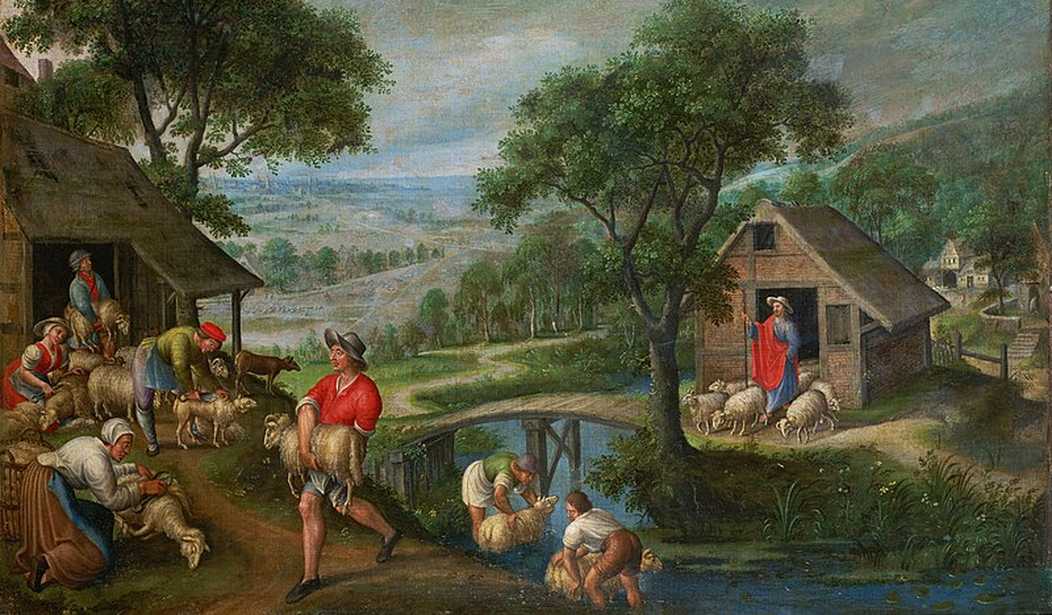This morning’s Gospel reading is Matthew 25:31–46:
Jesus said to his disciples:
“When the Son of Man comes in his glory, and all the angels with him, he will sit upon his glorious throne, and all the nations will be assembled before him. And he will separate them one from another, as a shepherd separates the sheep from the goats. He will place the sheep on his right and the goats on his left. Then the king will say to those on his right, ‘Come, you who are blessed by my Father. Inherit the kingdom prepared for you from the foundation of the world. For I was hungry and you gave me food, I was thirsty and you gave me drink, a stranger and you welcomed me, naked and you clothed me, ill and you cared for me, in prison and you visited me.’
“Then the righteous will answer him and say, ‘Lord, when did we see you hungry and feed you, or thirsty and give you drink? When did we see you a stranger and welcome you, or naked and clothe you? When did we see you ill or in prison, and visit you?’ And the king will say to them in reply, ‘Amen, I say to you, whatever you did for one of the least brothers of mine, you did for me.’
“Then he will say to those on his left, ‘Depart from me, you accursed, into the eternal fire prepared for the devil and his angels. For I was hungry and you gave me no food, I was thirsty and you gave me no drink, a stranger and you gave me no welcome, naked and you gave me no clothing, ill and in prison, and you did not care for me.’ Then they will answer and say, ‘Lord, when did we see you hungry or thirsty or a stranger or naked or ill or in prison, and not minister to your needs?’ He will answer them, ‘Amen, I say to you, what you did not do for one of these least ones, you did not do for me.’ And these will go off to eternal punishment, but the righteous to eternal life.”
Not long ago, I had a conversation on Twitter that took a rather cynical twist, as such social-media exchanges tend to do. I forget the specific context, but at the end I advised my friend to remember the Wizard of Id definition of the Golden Rule: He who has the gold makes the rules. That was meant in good humor, and received as such.
Perhaps it’s a coincidence that we have a Gospel parable from Jesus offering the true Golden Rule as the basis for final judgment. The disparity between the ideal and the corrupt Golden Rules gets to the heart of not just today’s readings, but the mission of Jesus and the arc of salvation history.
We learn the Golden Rule as children as the basis of both justice and peace: Do unto others as we would have done to us. If you have siblings, your parents probably taught you that before you could walk a straight line. While the Golden Rule has no overt religious reference, it presents the basis of Judeo-Christian life, and by no means exclusive to that tradition. That’s because of its truth and its practical wisdom. As children, it presents a critical limiting factor on behavior and represents the beginning of conscience and eventually caritas love of others. In that way, we become formed for faith and belief in the Lord, especially through recognition of our place in humanity and in Creation.
The problem comes when we grow older and stop valuing peace and harmony on a mutually-agreed-upon basis. We put aside the divine Golden Rule in favor of this world’s Golden Rule. For most of us, this isn’t even a deliberate choice or one made out of malice. Instead, we respond to the incentives of a fallen world and place our appetites ahead of our sense of caritas. We ‘put our noses to the grindstone’ to succeed on the terms this world sets. We seek wealth, influence, physical pleasures, and spend less and less time thinking about whether we treat others the way we hope to be treated ourselves.
When that happens, it becomes rather difficult to notice the hungry, the thirsty, the ill and imprisoned, and especially the stranger. It’s not that we shun them, necessarily, but that they never enter our minds. But that does not alleviate our responsibility for our brothers and sisters, as the goods of Creation are intended for all in abundance.
We understand that when we are children, because we do not own anything. Our parents provide it all for us, and parents usually make clear that sharing is an imperative for peace and harmony. We are only stewards of the goods in our parent’s universe, although children often confuse stewardship and ownership. That problem only becomes worse for us as adults, as we seek to acquire the goods of the world on a competitive basis rather than in cooperation, and we put our faith in ourselves rather than in the Lord’s salvation.
The sheep and the goats make this argument even more resonant. In this parable, the sheep represent those who follow the call of the shepherd, while the goats refuse the call and insist on doing whatever they feel like doing. The sheep come to the shepherd as children, accepting the authority and love of the Shepherd and working in concert for the good of the herd. The goats reject the Shepherd and the flock and do what they want for themselves.
Jesus takes this one step further in His parable by placing Himself in the role of The Other. Why? Jesus wants to emphasize that we are all the children of God, part of His creation, with equal dignity. To reject others is to reject Him and His authority as the Father of all. To accept His authority is to recognize Him in all others, regardless of their status.
The Golden Rule exists for our benefit, but it is not the true faith. Rather, it forms us to grasp the dignity of others so that we can learn and believe the Gospel, which is the story of how Jesus sacrificed Himself for us to give us the opportunity for salvation — and set the example for sacrifice for those who would follow Him to eternal life. We must choose which Golden Rule will guide us in life: His? Or ours?
The front-page image is “Parable of Christ as the Good Shepherd” by Marten van Valckenborch, c. 1580-90. On display at the Kunsthistorisches Museum in Vienna, Austria. Via Wikimedia Commons.
“Sunday Reflection” is a regular feature, looking at the specific readings used in today’s Mass in Catholic parishes around the world. The reflection represents only my own point of view, intended to help prepare myself for the Lord’s day and perhaps spark a meaningful discussion. Previous Sunday Reflections from the main page can be found here.







Join the conversation as a VIP Member